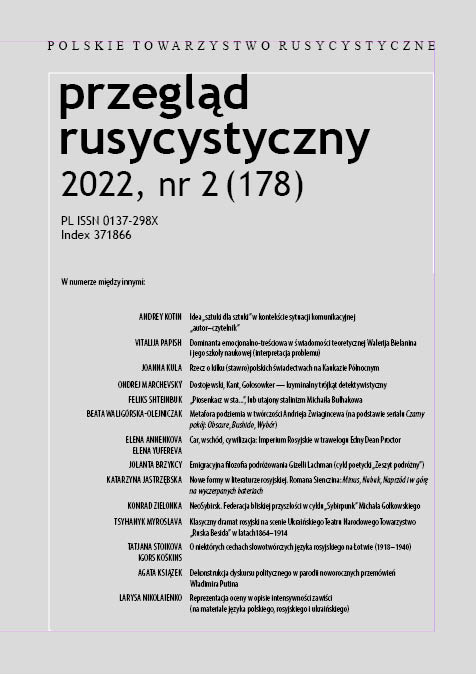METAFORA PODZIEMIA W TWÓRCZOŚCI ANDRIEJA ZWIAGINCEWA
(NA PODSTAWIE SERIALU CZARNY POKÓJ: OBSCURE, BUSHIDO, WYBÓR)
THE METAPHOR OF THE UNDERGROUND IN THE WORKS OF ANDREI ZVYAGINTSEV (ON THE BASIS OF THE SERIES THE BLACK ROOM: OBSCURE, BUSHIDO, CHOICE)
Author(s): Beata Waligórska-OlejniczakSubject(s): Russian Literature, Film / Cinema / Cinematography
Published by: Polskie Towarzystwo Rusycytyczne
Keywords: Dostoevsky; Zvyagintsev; underground; Obscure; Bushido; Choice;
Summary/Abstract: The aim of the article is the analysis of the three episodes of the series The Black Room (2000), directed by Andrei Zvyagintsev, i.e. Obscure, Bushido and Choice. The focus of the interpretation constitutes the metaphor of the under- ground, which is derived from Fyodor Dostoevsky’s novel Notes from the underground (1864). The author presents the case study of comparative nature, whose methodological framework constitutes the category of intertextuality, understood broadly as being close to Renate Lachmann’s notion of the memory of the text. So far the selected films of Zvyagintsev have not been the subject of detailed film analyses. The presented point of view allows us to identify the underground as the metaphor, which is crucial for understanding not only the mentioned episodes of the series but also other films of the Russian director. The noted thematic similarities as well as formal solutions lead to the con- clusion that the metaphor of the underground is first of all the sign of the empty form, the crisis of the contemporary world and the degradation of the human being, which are linked to the breakdown of the relationship between the individual and the collective.
Journal: Przegląd Rusycystyczny
- Issue Year: 2022
- Issue No: 178
- Page Range: 96-118
- Page Count: 23
- Language: Polish

